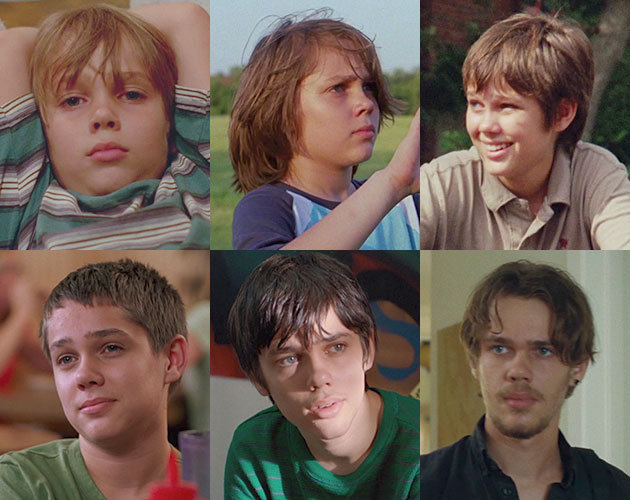Boyhood Review
http://mvfilmsociety.com/2014/07/boyhood/
Actor Ellar Coltrane through the years in the film Boyhood
August 27, 2014
There are some movies that generate revenue by their production quality. Kevin Smith’s Clerks is famous for being made on a budget of $27,000. The film Escape from Tomorrow got a lot of buzz for being shot at Disneyland and Disney World without any approval or permission from the parks.2014 saw the release of a film that doesn’t only work with its crazy production methods, but the methods enhance the story, and make it to be one of the most realistic, powerful, and incredible films to come out in recent memory. That film is Richard Linklater’s Boyhood.
The story and idea of production came from the Austin based filmmaker’s mind, to try his best to make a movie accurately depicting growing up. Linklater didn’t want to just make one story about one part of growing up, he wanted to capture all of it. So he and the cast met up every year for 12 years to capture the maturation process of people on film. The film itself is about a young man named Mason who grows up from age 6 to age 18, going through all the experiences that one goes through as a child. For instance, he would hang out with friends who happened to be bad influences and he moved to a whole new town and school. He had to face leaving the past behind, familial issues, graduate, and make new friends. So on paper, the real synopsis isn’t exciting, but while you watch it you notice it’s the collective stories of a young man discovering who he is, and how everything around him shapes his life.
Mason is portrayed by Ellar Coltrane, and while growing up, he helped not only portray, but shape who the character became. In the film, photography is an interest of Mason’s, which was and still is of Coltrane’s, after gaining interest to it from the set photographer of the film. Other cast members include Lorelei Linklater, the director’s own daughter, who was cast as Mason’s sister Samantha due to her constant energy and interest in being in a movie. In terms of bigger names, Patricia Arquette plays the Mom of the 2 kids, she being the one who takes care of and has custody of the kids, while Ethan Hawke plays the Dad, who on the surface seems like he is a deadbeat dad, but is actually shown to be an amazing father who unfortunately never got the chance to be around his kids enough.
While watching the film, you immediately forget that it’s a movie. The reality of life and how the filmmakers treat it rush through you and it’s just like you’re watching a real kid grow up. The film isn’t “perfect” as a movie, but that’s what makes it real. The child acting isn’t the best, the cinematography isn’t flashy or contrasted, the dialogue isn’t super eloquent, but that’s what makes it real. The way that Ellar portrays the character in the early half of the film is how a child acts. The look of the movie looks just like the life of an ordinary person. It’s not flat, and it’s not just like they turned on the camera without using any lights and went to filming. The camera work doesn’t take crazy risks with complex tracking shots or weird angle choices; everything’s filmed as if you’re seeing it right in front of your eyes. The writing, like the camera work, is so well planned and written that it’s a common misconception to think that it’s heavily improvised. Each moment is worked to make you connect and see it as a real life moment, strung together to depict the full experience of growing up.
The film can be viewed as either an experience of growing up, or a man looking back on his youth just as he’s leaving it. We never see the huge landmark moments in Mason’s life. There are virtually no “first things” we see Mason experience, and only one time do we see a birthday or get a specific age number. He just lives. Each moment is huge, but not huge for what you think it is. You leave the film thinking about each scene in succession of what you saw, and unlike a regular movie in which you think about how cool the movie was, you get the experience like you are thinking back on the experiences of the past that you’ve gone through.
It’s a film that, even if not treated well in the awards circuit, not given superlatives, or fades out of attention, is still an incredible and astounding achievement. It can be said that at least once that something this special and candid was caught on film at least once in the history of cinema—which is more important than any golden statue handed out to the filmmakers.



